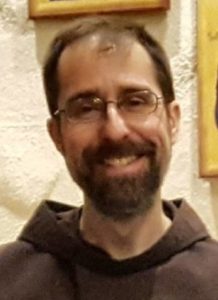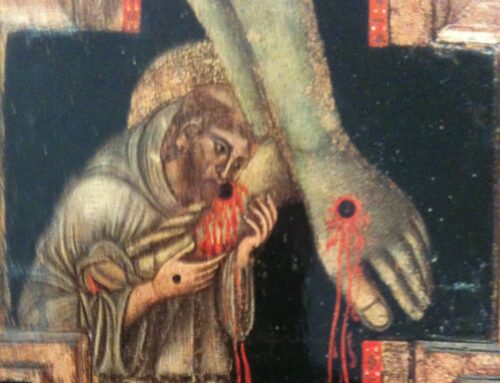(This article originally from TAU-USA Issue 102 Winter 2021)
By Mary Stronach, OFS

Fr. Jerome Wolbert, OFM, CNSA President
Not surprisingly, the Conference of National Spiritual Assistants, understanding the impact that the pandemic has had on the brothers and sisters, took the opportunity to address the issues of this new reality.
“In these isolating moments, where can God be found?,” asked President- in-turn Fr. Christopher Panogoplos, TOR. “What has isolation meant to you in these areas — social, spiritual, emotional and political?”
Spiritual Impact of Pandemic
Br. Alexander Escaleras, OFM Cap, pointed to our responsibility to others. “We must consider the welfare of others who surround us even if our own life is not going the way we want it.”
He shared a personal story about his brother, Deacon Steven, who died from liver disease complications in October 2019. A few days before his death, a cleaning lady shared with him, and family members present, her own suffering having just discovered that her daughter had diabetes and other problems. His brother, who had a tracheotomy and could not speak, raised his hands in the form of prayer. “Translation: ‘I’m going to pray for
you.’ Even as he lay there dying, my brother was given the grace by God to think of others in their need.”
“Be safe and healthy,” he closed, “and may God give you His grace to think of and help the other.”
Social Effects of Pandemic
Fr. Chris Shorrock, OFM Conv, noted that social distancing goes against our psyche and our human tendencies. It can “easily lead to a sense of isolation and unrest, especially if
we are in what has been described as being vulnerable due to age or any pre- existing medical conditions.”
Quoting David Couturier OFM Cap, he said, “the challenge we face in this time of pandemic is how to deal creatively, contemplatively, and constructively with distance.”
Individuals and fraternities are discovering new ways to meet virtually on plenty of online video platforms,
he said. Prayer searches on the internet have skyrocketed. We’ve been attending Eucharist on-line; virtual groups have formed, some spiritual and others strictly social.
“Religious and spiritual practices
deliver something special when they are done socially – a deep sense of community and connection with something larger than us,” he continued.
“While these technological changes have shown promise in meeting people’s more immediate spiritual concerns, months of self-isolation, rising unemployment and mounting death tolls will surely present fresh challenges.”
Fr. Chris suggested that as we go forward, these on-line communities “will likely not be enough.” And “what about our members who are not so technically minded?” he asked. “…and not being able to honor loved ones in funeral rites? The lack of these rituals, which bring people together, will surely affect the process of grieving.”
“It is difficult to replace in-person human connection when we are at our most vulnerable,” he added.
While we may someday return to our in-person celebrations and rituals, “some things will be forever changed by the crisis. And the new skills and online practices learned at this time
will impact the ways Franciscans engage with the religious and spiritual into the future,” he said.
He concluded: “Now is the time
to be physically apart but spiritually connected, appreciative of the deepest bonds we have, in touch with the integral peace we have with God, with creation, and with one another. It is time to become ever more aware that Jesus is the God of all nearness and He is the Lord of every distance and in Him we live, move, and have our being.”
Emotional Impact of Pandemic
Fr. Jerome Wolbert, OFM, who became president-in-turn at the end of the chapter, took the conversation further by noting:
“God created us with emotions, and he saw that it was very good.”
Emotions such as anger, sorrow, confusion, anxiety or distress “play a role for us,” he said. “They can help us
to develop a greater connection and to deepen our love. Conflict, in fact, can actually help us grow in love.”
Depression is a kind of anger; anxiety can lead to anger. We have to consider the blessings of anger, he said. The question is, “how do we express it?”
“Emotions are a gift. We have to learn to unwrap them,” he added.
As an example, he identified the work of Mothers Against Drunk Drivers, who, in an “incredibly courageous act” found a way to address their anger in a positive pro-active way. We must search for “creative solutions.” He reminded attendees that while emotions such as anger are natural responses, sometimes our reactions need to be adjusted.
Political Impact of Pandemic
We develop a well-formed conscience through prayer, Fr. Christopher noted. “Don’t jump to
conclusions. Listen to what God wants. Test what we feel. Listen to what the Church has to say historically.” He added that we need quiet to listen to one another – to experience the beauty of dialogue.
He said: “Franciscans are called
to take seriously the demands of the Gospel, to be agents of reconciliation and peace. (We are called to) alleviate suffering; extend hope; provide for
the well-being of others. There can
be no two sides of this divide. All of us need to do better at encountering and accompanying one another on the journey of life.”
“Politics is something nobler than posturing, marketing, and media
spin,” he said. These sow nothing but division, conflict, and a bleak cynicism incapable of mobilizing people to pursue a common goal…In thinking of the future, we do well to ask political leaders: ‘Why are you doing this? What is your real aim?’



Leave A Comment